Weekly Roundup of Breaking Marketing News Brought To You Each Friday
News 4/15/2024 to 4/19/2024
This week: Walmart is losing market share in the ecommerce world, meta-advertising costs are on the rise, and there's a new king of smartphone market share.
Here's what happened this week in digital marketing:
1. Consumers Changed Shopping Habits in Q1 2024
Overall, ⅓ of consumer online spending decreased over Q1.
According to eMarketer, we’re seeing some interesting trends:
- Amazon shoppers are motivated by price → 71% of shoppers look for the lowest price; customers stay price-sensitive
- Amazon edges out search engines for whopping queries → over ½ of consumers start their search on Amazon
- Walmart is losing its ecommerce share → the percent of consumers shopping on walmart.com declined by 15%
- TikTok Shop is seeing success → 35% of consumers browse or shop on TikTok Shop at least once a week
- Amazon’s View in Your Room AR Tool is proven valuable → 31% of consumers have used the AR tool and it’s led them to purchase something they would normally only buy in person
2. Do You Have a Loyalty Program?
If not, it’s not too late to set one up.
According to eMarketer, discounts are the leading factor in why consumers participate in loyalty and reward programs.
Why do consumers turn to loyalty programs?
For the discount. With rising prices, it’s appealed more than ever to join these loyalty programs.
So, if you build a loyalty plan, keep these in mind.
3. What’s Causing Ad Prices to Rise on Meta?
It’s not just inflation. According to a report by Bloomberg, it’s because of a few bugs in the system.
“[Meta’s ad system] has been hampered by major performance issues, according to numerous marketers,” the report says. “The cost of running ad campaigns is up significantly, while results are mixed and ensuing sales are down — and there has been no formal explanation from the company, ad buyers say.”
Meta, for its part, has responded. The company says it “fixed a few technical issues” and continues to investigate reports from advertisers.
The report also says that not every advertiser is affected. So your account might be just fine.
4. Samsung Beats Apple in Smartphone Market Share
The smartphone sector is seeing a shakeup.
By March:
- Apple held a 17.3% market share
- Samsung rose to 20.8%
- Xiaomi, a China-based smartphone supplier grew to 14.1%
While Apple traditionally releases new products in September in anticipation of the holiday season, we’ll have to keep an eye on how smartphone sales fluctuate throughout the year.
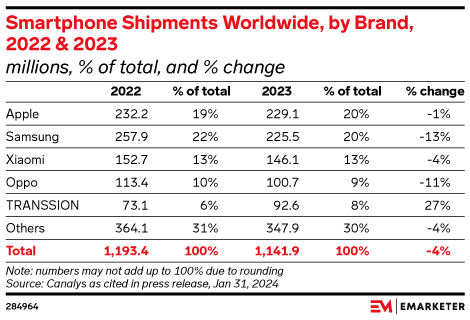
5. How Long Does It Take a Reddit Post to Rank on Google?
If you post the right keywords and decent content, you can rank in as little as 5 minutes on Page 1 of Google. That’s according to a Reddit thread.
Reddit user gronetwork shared that it only takes a few minutes to get a Reddit post to appear at the top of the SERPs.
“I have created for example a post named ‘Google SGE Review’ previously,” he wrote. “After less than 5 minutes it was ranked 8th for Google SGE Review (no quotes).”
He even shared a screenshot.
But Google’s Danny Sullivan entered the chat and said that “Reddit is not always prioritized over other forums.” He went on to share multiple examples.
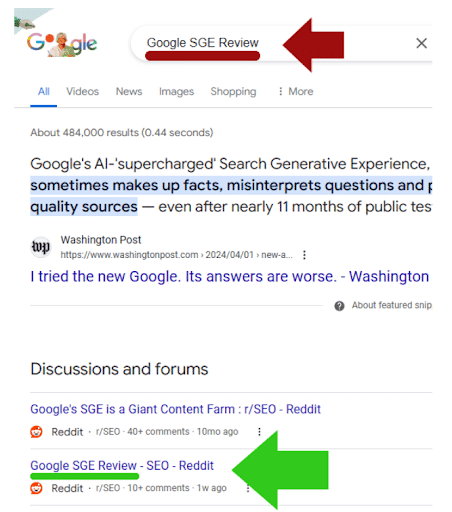
6. Can a New WordPress Plugin Help With Load Times?
It looks that way.
A new announcement from WordPress shares details about the recently published “Speculative Loading” plugin.
According to the write-up, the plugin can give you “near-instant page load times.”
That should help your Core Web Vitals scores.
How does it work? According to WordPress, the Speculative Loading plugin makes use of the Speculation Rules API. That’s an API that allows you to define rules about which kinds of URLs get prefetched or prerendered.
Keep in mind: that it’s still an experimental plugin. And it requires Chrome 121 or higher.
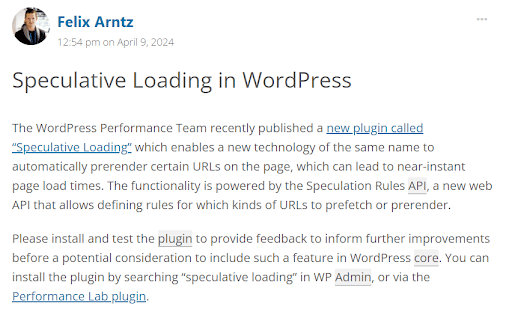
7. Are RPM Earnings Dropping on Google Ads?
Lots of publishers seem to think so.
A thread on Google Support Forums highlights the problem. The original poster starts off with this complaint: “My RPM and earnings dropped like crazy 3 days ago.”
More than 170 people clicked the “I have the same question button.” And the replies contain testimonies of folks experiencing similar issues.
RPM, in case you’re wondering, stands for “Revenue per 1,000 impressions.” It’s a way some marketers measure the value of their ads against traffic.
In any case, if you’re experiencing a similar drop in revenue, you’re not alone.
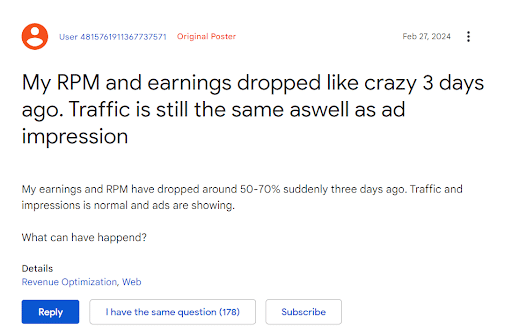
8. Are Domains With Hyphens Bad?
That’s the question posed on a Reddit thread this past week.
Fortunately, Google’s John Mueller replied with an answer.
“It used to be that domain names with a lot of hyphens were considered (by users? or by SEOs assuming users would? it's been a while) to be less serious - since they could imply that you weren't able to get the domain name with fewer hyphens,” he said. “Nowadays there are a lot of top-level domains so it's less of a thing.”
Mueller went on to say that you should pick something for the long run instead of focusing on keywords.
9. Which Search Engine Does Gen Z Prefer?
They still love the Big G.
According to a report by Axios, 46% of folks aged 18-24 start info requests with Google. That compared to 58% of those aged 25-39.
Twenty-one percent of Gen Z’ers start searches with TikTok. Only 5% start with YouTube.
Some searchers prefer social media for more “authentic answers,” according to the report. That’s because you can get smaller bits of info from different sources. And no ads at the top.
Finally, Gen Z reports high satisfaction scores with Google’s Search Generative Experience.
10. What’s the Latest in Google Automatic Ads?
Google just announced a new ad format called “ad intents.” It links anchors into text on your website related to your content.
When a user engages with one of those anchors, the page will open a dialog box that shows related search results with ads that can help boost your revenue.
The new ad format is purely optional. You’re welcome to exclude ad intents from your website if you’d rather go with your existing advertising strategy.
11. How Would You Like to Work With a Virtual Influencer?
You can do that soon, thanks to TikTok.
According to a report published by The Information, TikTok is developing an army of virtual influencers. Unsurprisingly, they use AI tech.
The influencers will read scripts for video ads. The scripts are created from prompts.
And who provides the prompts? You do.
Everything is still in the testing phase. So a lot can change between now and the official release date.
12. Would You Like More Control Over Where Your Ads Appear on TikTok?
According to a new announcement by TikTok, you now get to choose where your ads appear. And, more importantly, you get to choose where they don’t appear.
You’ve got two options:
- Category exclusion - decide if you want your ads to appear alongside gambling, violent video game, combat sports, and youth content.
- Vertical sensitivity controls - select the industry verticals relevant to your campaigns.
TikTok also expanded its partnership with third-party verification companies to provide post-campaign analytics
Homework
Enjoy the Spring flowers and then take care of these action items:
- If you advertise on TikTok, make sure you take advantage of those new brand safety tools.
- Keep an eye on your RPM numbers on Google Ads. If they’re dropping, take action.
- Talk to your development team about the advantages of using speculative loading for your WordPress websites.
- Keep an eye on your ad spend on Meta. You may have to scale back until the company can fix some of its technical problems.
News 4/8/2024 to 4/12/2024
This week: Learn which types of posts get the most engagement on LinkedIn, uncover the most popular forms of influencer content, and dive into the newest API.
Here's what happened this week in the digital marketing news:
1. Which Types of Posts Get the Most Engagement on LinkedIn?
The folks at SocialInsider conducted a study to answer that very question.
Here are a few key findings from the research:
- Multi-image posts get the most likes and comments
- Videos get the most shares
- Polls generate the highest impression rate
- Multi-image posts with brief captions have the highest engagement rate
Social Insider also says that the overall engagement rate on LinkedIn increased 44% year-over-year.
The study looked at pages with a follower count between 1,000 and 1 million during the period ranging from January 2022 to December 2023.
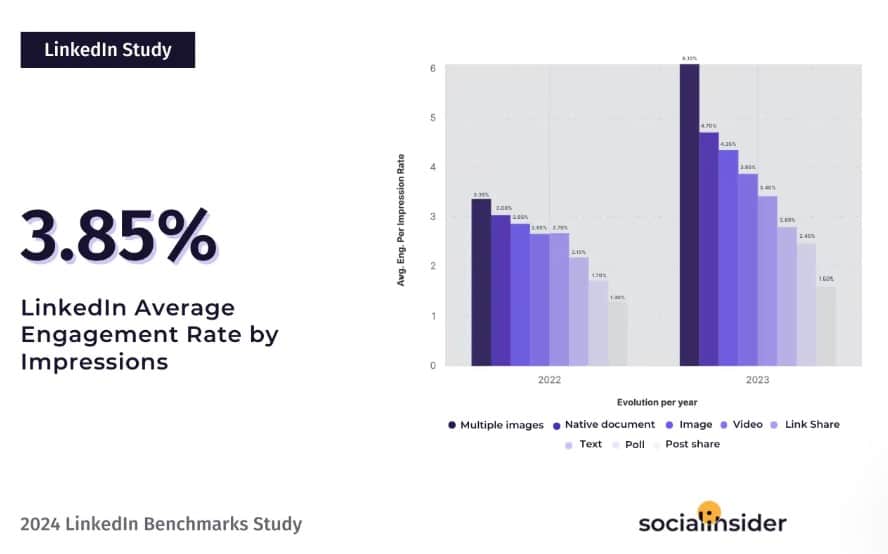
LinkedIn Engagement Study
2. eMarketer Reports Most Popular Form of Influencer Content
What’s the most popular form of influencer content on social media?
If you guessed cooking, that’s correct.
According to eMarketer, cooking recipes are the most popular form at 51% and are preferred over product reviews, tutorials, and lifestyle content.
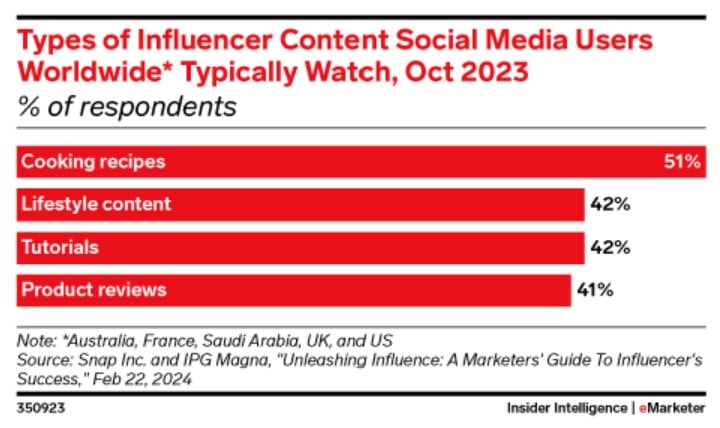
eMarketer Survey on Influencer Content
3. Is Video a Valuable Tool for B2B Marketers?
It would appear so.
LinkedIn released an infographic this past week highlighting the value of video in B2B marketing.
Here are some of the key takeaways:
- 59% of B2B marketers identified video as a leading marketing technique they intend to use this year
- 2 out 3 marketers say they’ll increase video use in the coming year
- Video facilitates authentic storytelling
LinkedIn also shared the various tools it provides that can help with video marketing.

Video is a Valuable Tool for B2B Marketing
4. YouTube Shopping Updates Bring New Efficiency to Creators
Speaking of YouTube, the platform introduced new updates for shopping creators.
- Shopping Collections: Set up their own collections to show off their favorite products. They show up in your product list, store tab, and video description.
- Affiliate Hub: Access to the latest list of Shopping partners, competitive commission rates, promo codes, and the ability to request samples from top brands.
- Tagging: Tag products and merchandise across the entire video library at once
- Fourthwall: Makes it easier for creators to create and manage stories directly in YouTube Studio
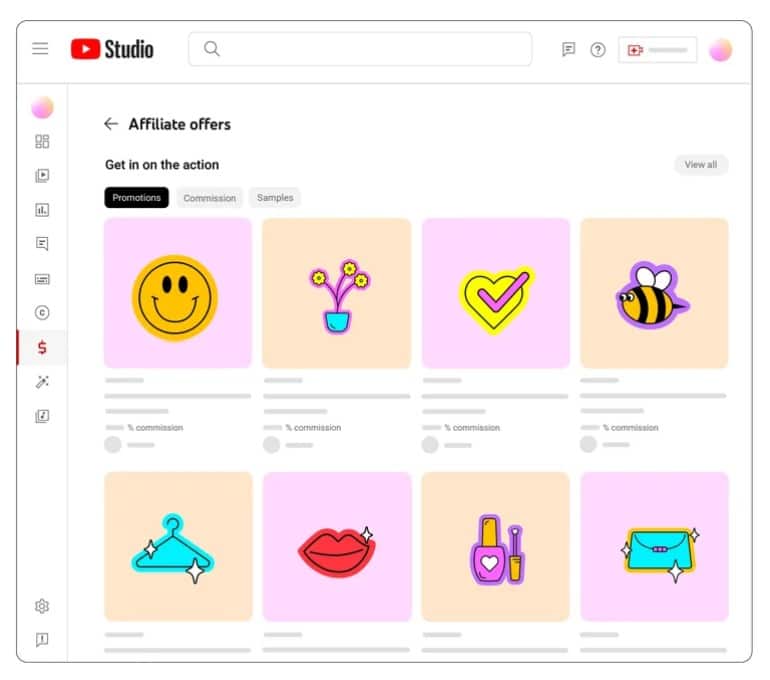
YouTube - New Affiliate Hub
5. Why Does Google Show Reddit Search Results So Often?
That’s the essence of a question posed by Lily Ray this past week on X. She was particularly concerned about YMYL queries returning results with Reddit threads.
In response, Google Search Liaison Danny Sullivan answered by saying that the Reddit panel appears if the Google search algo determines that it’s “relevant and useful.”
Sullivan also said that, while SEOs might not appreciate the Reddit panel toward the top of the search results, searchers do appreciate it.
“They proactively seek it out,” he said. “It makes sense for us to be showing it to keep the search results relevant and satisfying for everyone.”
Sullivan also said that he’d pass Ray’s feedback to the search team.
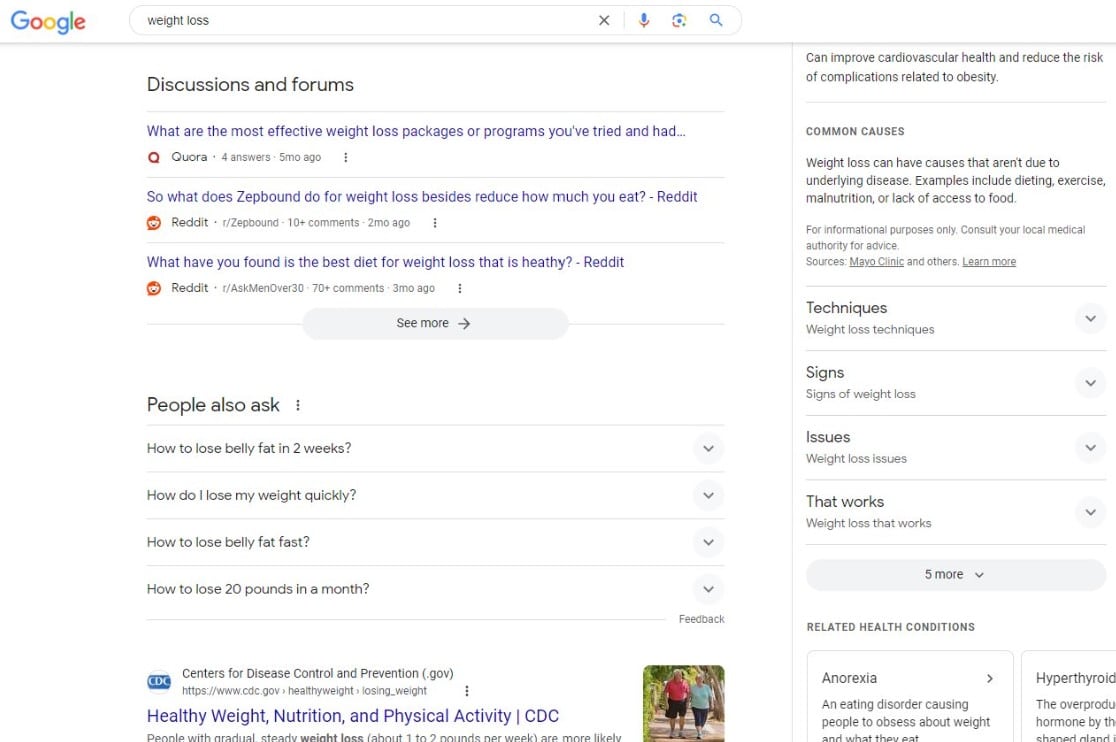
Reddit Queries in Top Search Results
6. Should You Disallow Internal Footer Links?
Nope.
That’s according to John Mueller.
Recently on Reddit, somebody asked the following question: “Big site I'm working on and client has a handful of pages in their footer that have no backlinks, traffic, nor authority score. These pages however, according to client are important for some people there. Should I disallow them in Robots but keep them in footer?”
Mueller replied: “If you do this, future-you will be annoyed by the problems current-you is creating.”
In the past, Mueller has criticized the practice of making internal links nofollow.
“I think it’s a waste of time to do that,” he said.

SEO Questions About Internal Linking
7. Are You Ignoring Bing to Your Peril?
So what’s the story with that “other” search engine these days?
According to Bing PM Fabrice Canel, “Bing usage extends beyond what many search engine optimizers (SEOs) may realize.”
He pointed to a Statcounter chart showing Bing steadily (although slowly) gaining market share since 2019.
“Additionally,” he said, “it’s important to remember that Bing powers several other search engines, including DuckDuckGo, Yahoo, Ask, Ecosia, Swisscows and more surfaces as Windows, Copilot and more. If you sum up all, the impact is even more significant.”
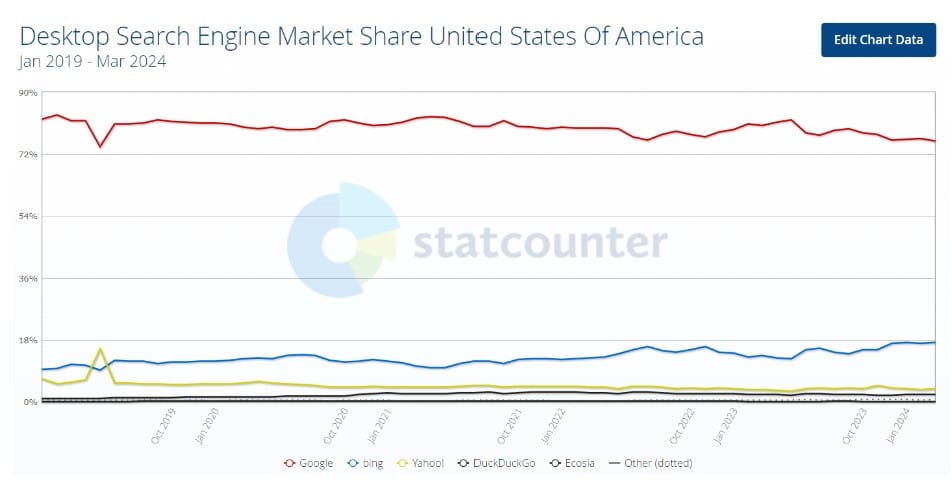
Search Engine Market Share via Desktop
8. Does Google Use Ad Strength in the Ad Auction?
According to Google’s Ads Liaison Ginny Marvin, Google does not use ad strength in the ad auction.
The subject came up on X recently, with Marvin saying that ad strength “is a diagnostic tool that was developed to help advertisers understand how the diversity and relevancy of their creative assets can maximize the number of ad combinations that may show for a query.”
She went on to say that ad strength could explain the lack of impressions. But it would never prevent ads from entering into auctions.

Attributes that Affect Ad Strength
9. Who Is Snapchat Partnering With These Days?
This past week, Snapchat announced a series of new partnerships. The integrations will help you get the most out of advertising on the platform.
First up: Snap announced a partnership with Snowflake. That will enable you to “quickly implement Snap’s Conversions API (CAPI) signal solution without needing to build a bespoke back-end integration.”
Snapchat is also partnering with AppsFlyer. That’s an iOS-specific product that gives you insight via Mobile Measurement Partner (MMP) attribution.
Finally, Snap is updating its Event Quality Score (EQS). Use that to “understand signal health with greater precision.”
Homework
While the April showers are falling, you should have plenty of time to take care of these action items:
- Take a look at the TikTok guide on promoted posts to learn more about how to turn organic posts into ads.
- If you’re in the B2B space, put together a strategy for using videos on LinkedIn.
- And take a look at that study on which types of posts get the most engagement on LinkedIn. Make sure you’re creating that type of content.
- Take advantage of those new Snap partnerships to get more insight into your marketing on Snapchat.
News 4/1/2024 to 4/5/2024
This week: Find out where mobile advertising is growing the quickest, what new targeting features Meta is revealing, and how much time you should be focusing on backlinks.
Here's what happened this week in digital marketing.
1. U.S. Mobile Advertising Is Growing Rapidly
US mobile ad spending will cross $200 billion this year, representing over half (51.2%) of total media dollars spent in the US and nearly two-thirds (66.0%) of digital ad dollars. The vast majority of mobile ad spending will take place in apps.
So, where is mobile advertising growing most quickly?
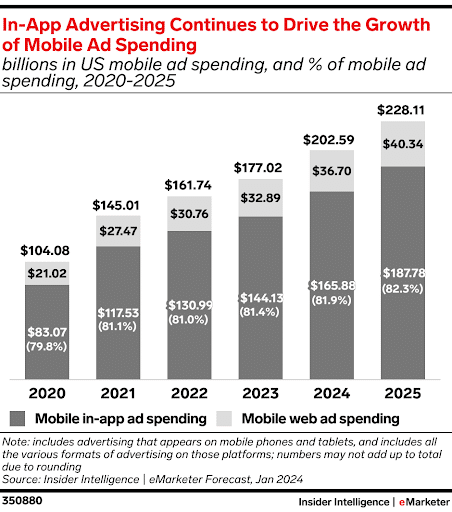
eMarketer In-App Advertising Drives Growth of Mobile Ad Spending
Apps will reach a dominant 81.9% share of mobile ad spending this year, but mobile web advertising also continues to add more dollars each year. Amazon accounted for 40% of ecommerce sales, and 4% of retail sales in 2023.
2. Gen Z Still Spends More Time on TikTok Than Any Other Age Group
According to eMarketer, time spent on social media among US adults who use social platforms will peak at an average of 1 hour and 50 minutes (1:50) next year (2025).
TikTok is still tops among most generations, but its growth is slowing—even among Gen Z. While it’s still incredibly popular, the app’s heyday could be coming to an end as it matures and deals with user gripes like its increased ad load and frustrations with TikTok Shop.
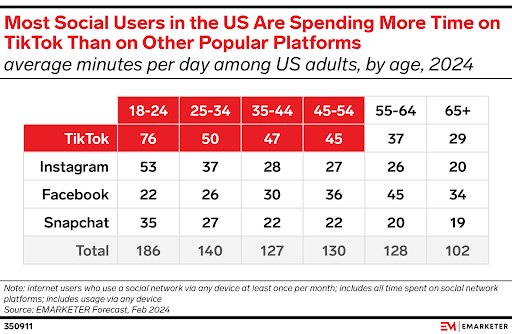
More Users Are Spending Time On TikTok
3. Meta's New Targeting Options Within Advantage+ Shopping Campaigns
No, this wasn’t an April Fool’s joke.
On Monday, Meta revealed new capabilities, allowing you to generate reporting breakdowns of your audience. Specifically reporting on those who have yet to convert.
New features include:
- Enhanced Audience Insights: Use it to define your engaged customers from the rest of your audience
- Demographics By Audience: Within the Reports breakdown, you’ll see separate rows for New Customers, Existing Customers, and Engaged Customers
When using Advantage+ Shopping Campaigns, advertisers turn over most targeting control to the platform.
These new tools will help marketers analyze how many sales come from new customers vs. current customers, and how many people are engaging with your brand without converting.
4. Do Google's 'Top Ads' Always Appear at the Top?
Not necessarily.
Google recently updated its ads help document. Here’s how it now reads: “Top ads are adjacent to the top organic search results. Top ads are generally above the top organic results, although top ads may show below the top organic results on certain queries. Placement of top ads is dynamic and may change based on the user’s search.”
The Google help page says the same thing.
So “top ads” might not be the correct phrase to describe them.
Google’s Ads Liaison, Ginny Marvin, says that the definition change doesn’t affect how performance metrics are calculated.
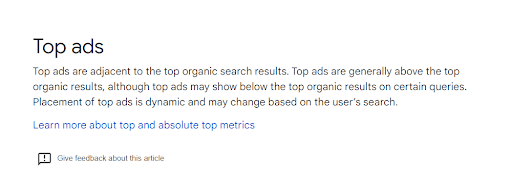
Top Ads - Quote from Google
5. YouTube Works to Provide Creators With Deeper, Valuable Insights
YouTube wants content creators to optimize their content more effectively. To do so, they need to understand what content their audience likes.
So, they’re rolling out three new updates:
- Live Stream Reaction Analytics: Creators can monitor viewers’ reactions in real-time, seeing data on the number and types of reactions from viewers
- Impression Breakdown: See the number of impressions segmented by new vs returning viewers for a clearer view of what content your audience likes
- HDR Live Streaming: Provide your viewers with higher-quality video. Think crispier whites and deeper blacks, and colors that pop
You’ll find the tool in YouTube Studio Analytics.
6. Are You Spending Too Much Time Focusing on Backlinks?
This past week on the SEO subreddit, somebody asked why Google Search Console shows a couple of backlinks for a web page whereas Ahrefs shows nothing.
Google’s John Mueller responded to that.
“There’s no objective way to count links on the web,” he said. He went on to say that every tool has its own method for collecting backlinks.
He also said that digital marketers “should not focus” on backlinks.
“There are more important things for websites nowadays, and over-focusing on links will often result in you wasting your time doing things that don't make your website better overall.”
7. Will Small Improvements in Core Web Vitals Boost Your Rank?
It doesn’t look that way.
In a recent Search Off the Record podcast, John Mueller said that obsessing over your yellow or even red Core Web Vitals scores won’t bear much fruit.
“I think a big issue is also that site owners sometimes over-fixate on the metrics themselves,” he said. “They see some number, and it’s like, ‘Oh my gosh, I have to get this to like some other number, some higher state.’ And then they spend months of time working on this. And they see this as they’re doing something for their Search rankings.”
Mueller went on to say that “incremental changes” probably won’t be visible in search.
8. How Can You Get Additional Insights From Reddit?
Reddit just announced a partnership with Cision. It’s an integration that enables Cision users to gather trend info from Reddit’s 100,000 active online communities.
“Cision provides a social suite that monitors public conversations about brands, topics, products, and campaigns,” Reddit said in a statement. “By accessing Reddit’s Data API, Cision can layer more rich and real-time insights into their suite of products. This will give customers a richer view of consumer preferences, empowering them to develop data-driven marketing and communication strategies faster and with greater accuracy.”
And Cision says it will use Reddit’s API to “supercharge” the development of AI-driven reputation and audience analysis tools.
9. How Is X Doing These Days?
According to a new report by Edison Research, Twitter/X usage dropped 30% in the past year.
The research shows that the number of U.S.-based X users fell from 77 million in 2023 to 55 million this year.
Other recent third-party reports also show a decline in X usage. None of them show a drop of 30%, though.
X, for its part, says that it has 250 million daily active users worldwide. That’s the same amount from November 2022.
10. When Is the Best Time to Make Changes for the Core Update?
Recently on Reddit, somebody asked if the March Core Update has finished rolling out yet and when to start making changes to his website in line with the new changes.
The website owner also said that the site lost 60% of its traffic already.
In response, John Mueller answered that no, the core update hasn’t finished rolling out yet. And he told the SEO to start making changes right away.
“Regardless, if you have noticed things that are worth improving on your site, I’d go ahead and get things done,” he said. “The idea is not to make changes just for search engines, right? Your users will be happy if you can make things better even if search engines haven’t updated their view of your site yet.”
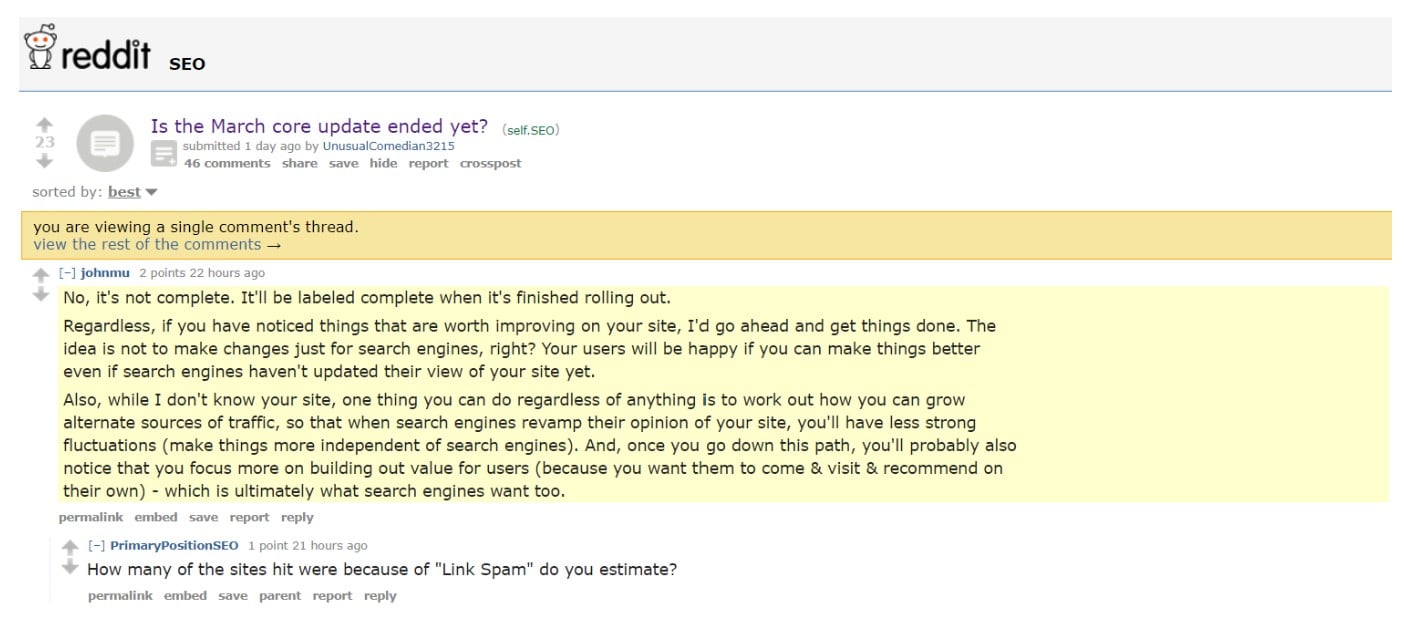
Advice on Dealing with the March 2024 Core Update
11. Can You Use ChatGPT Without a Login?
You can now.
A recent announcement from OpenAI offers this good news: “Starting today, you can use ChatGPT instantly, without needing to sign-up.”
OpenAI also says that content shared in ChatGPT might be used for training its large language model (LLM). However, the company says you can turn that off via the Settings.
And then there’s this: “By sending a message, you agree to our Terms. Read our Privacy Policy. Don’t share sensitive info. Chats may be reviewed and used to train our models. Learn about your choices.”
Be careful out there.
12. Are Websites Recovering From The Core Update?
I mentioned last week that no sites hit by the recent Helpful Content Update have recovered. But what about sites that got adversely impacted by the Core Update?
According to Glenn Gabe, some of them have bounced back. He posted a few screenshots on X this past week showing organic traffic recoveries.
Regarding the Helpful Content Update, though, he also posted this: “Checked the visibility of 360+ sites impacted by the Sep HCU(X) and none have bounced back at all still. Most are down even more.”
Looks like those folks are in trouble.
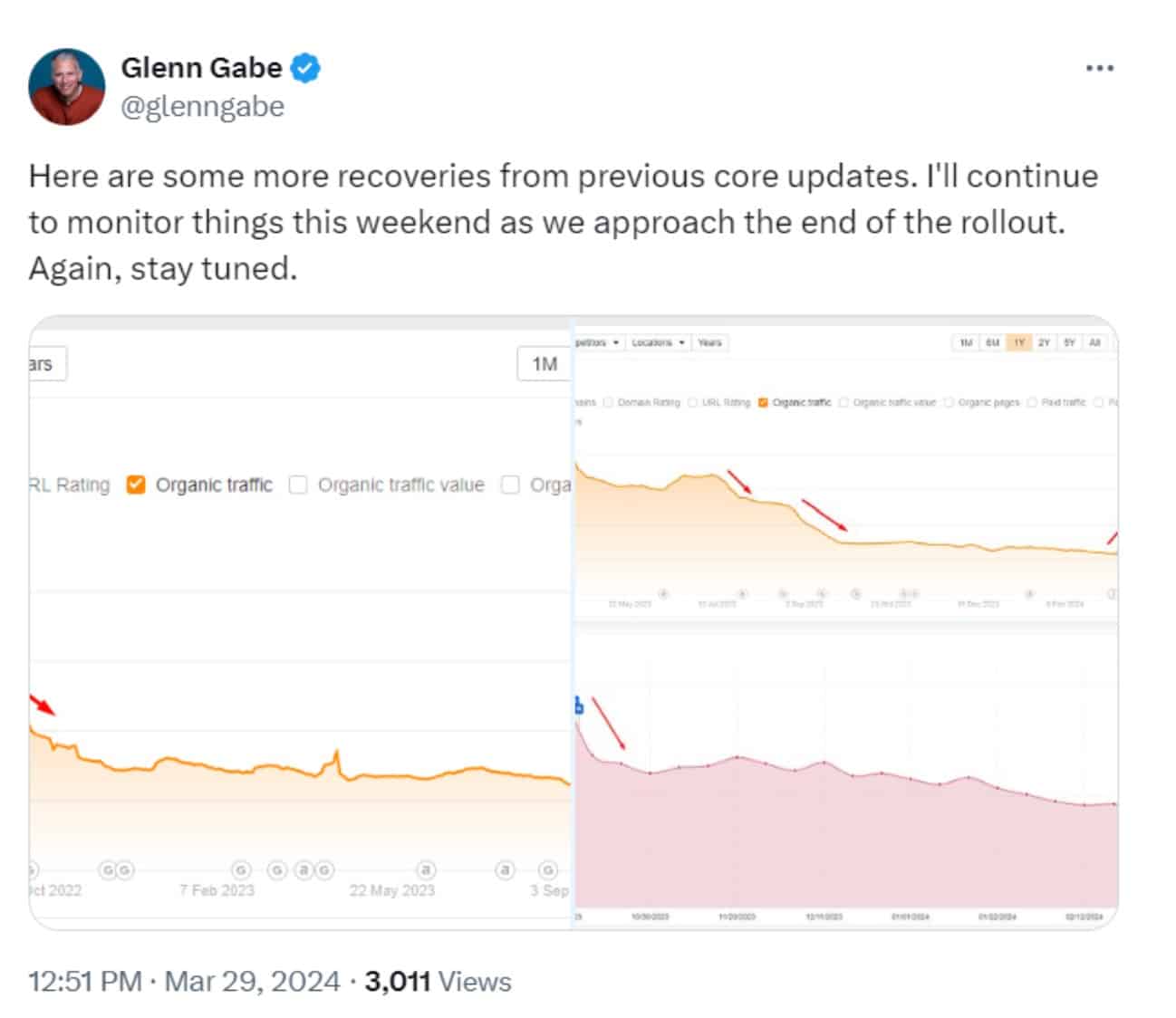
March 2024 Core Update Impacts
Homework
Before the NCAA basketball season comes to a close, take care of these action items:
- If you think your site got hit by either one of the recent updates, feel free to take action now. There’s no reason to wait any longer.
- If you’re into Reddit marketing, take a look at the Cision integration to gain more trend insights.
- Also, take a look at those new YouTube analytics to learn more about the people watching your videos.
News 3/25/2024 to 3/29/2024
This week: A Google study reveals SGE might be harming organic search traffic, new stats on sites affected by spam updates, and Google's got some tips on posting content.
Here's what happened this week in digital marketing.
1. Google’s Testing New Generative AI Product Search Elements
The way you shop for clothes online is about to change… for the better.
Google’s trying new shopping elements to help users speed up their discovery process.
New features include:
- Related Style Recommendations: Upvote or downvote similar styles
- Virtual Try-On: See clothing on models ranging in sizes XXS-4XL
Google’s been testing out these features and soon they’ll be available to more users through its experimental shopping experience.

Google New Shopping Elements
2. Another Google Analytics Bug!
Earlier this week, Google confirmed a bug within Google Analytics.
The bug left users wondering about their real-time traffic.
Some users reported seeing zero traffic, while others reported everything was fun.
Lucky for you, the bug’s been fixed and all real-time traffic is accurate again.
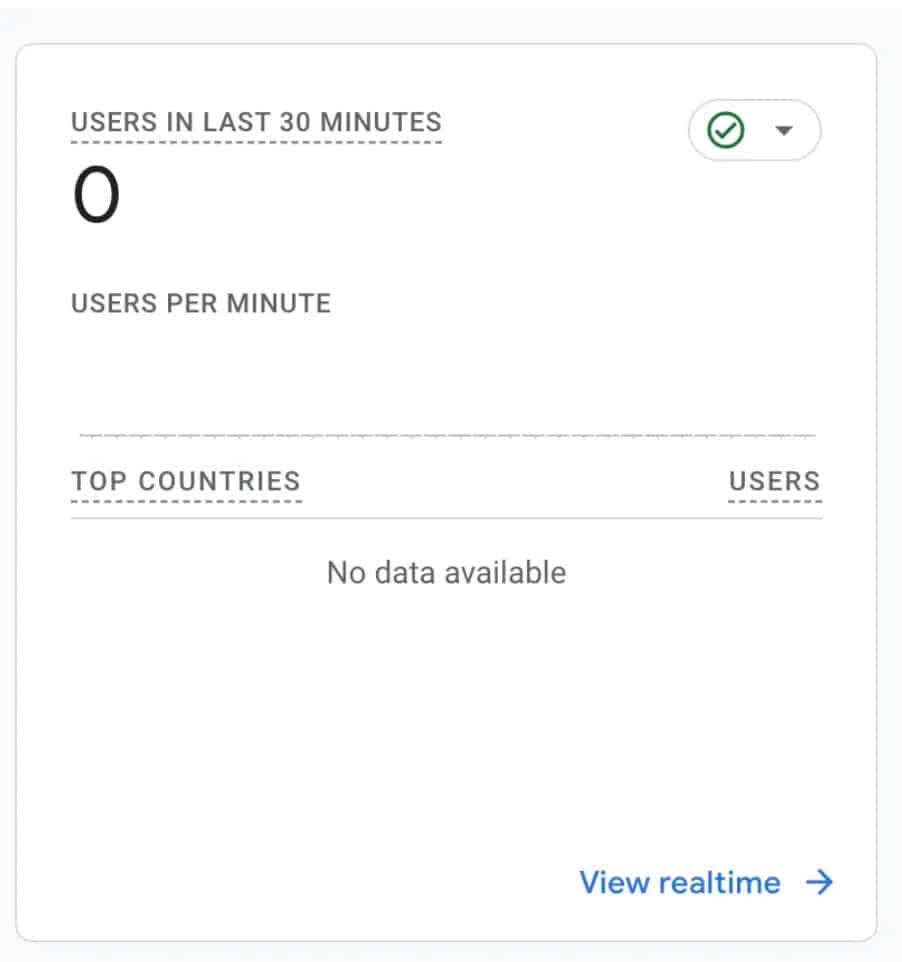
Example of Reporting Showing No Real-Time Traffic
3. Google Introduces New Product Structured Data Type
Turns out Google’s into 3D.
The company added a new 3DModel markup type to its documentation.
Could a 3D product display rich result be on the way?
Google says 3DModels are increasingly used on product webpages, so this will give merchants a new way to add information.
4. LinkedIn Ads Releases New Campaign Tracking Tool: Dynamic UTMs
LinkedIn marketers listen up!
The platform is launching its new solution to campaign monitoring that does not involve third-party cookies.
Dynamic UTMs, which will be fully rolled out by the end of March, eliminate the need to manually set up UTM parameters.
Why is this a big deal?
Manually setting up UTM parameters is time-consuming, inefficient, and usually results in errors.
So LinkedIn is trying to combat these issues.
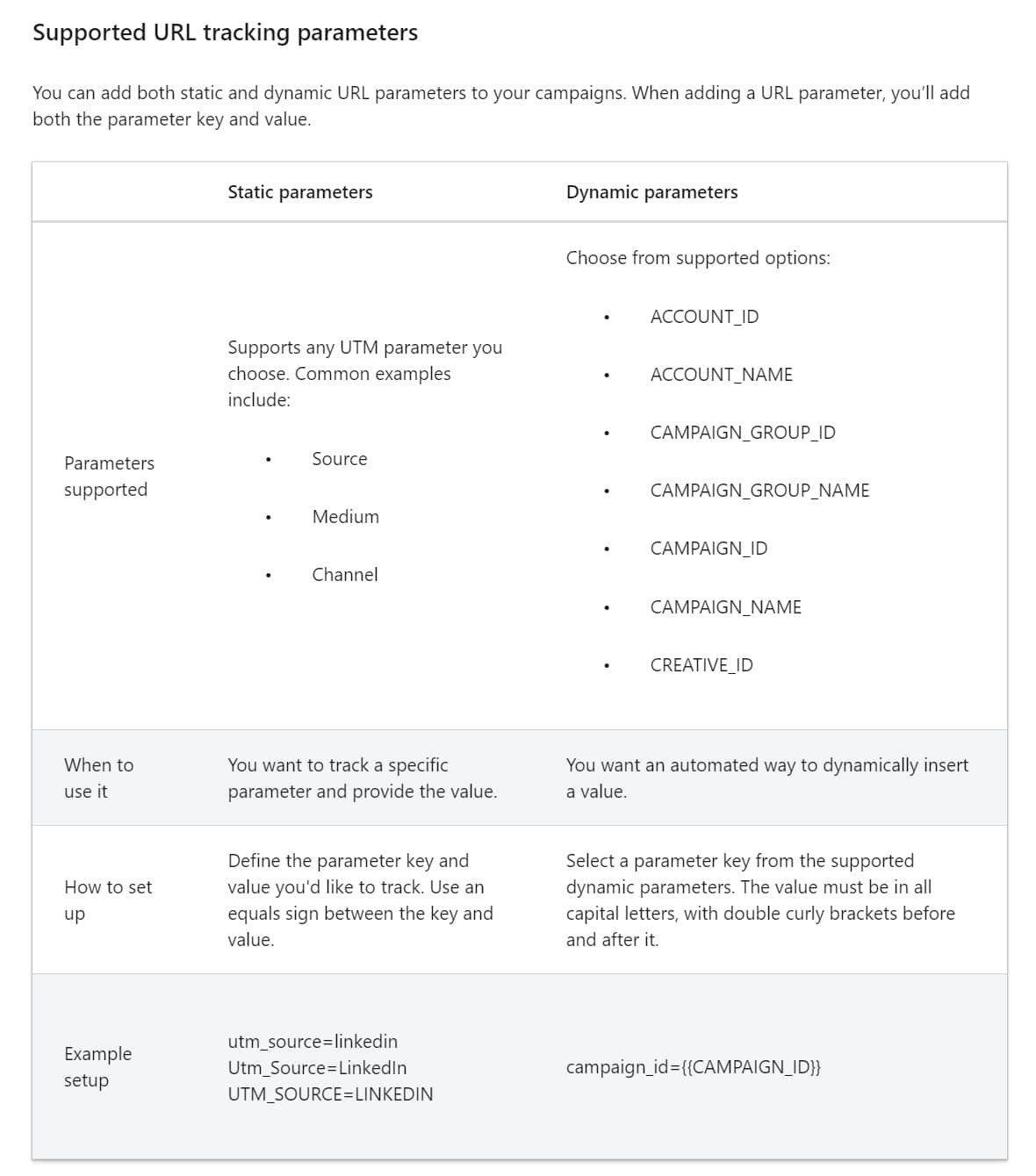
LinkedIn URL Tracking Parameters
5. Google’s Study Reveals SGE Might Harm Brand Visibility
The study looks at brand visibility and organic search traffic. Here are the findings:
- When an SGE box is expanded, the top organic result drops by over 1,200 pixels on average, significantly reducing visibility.
- 62% of SGE links come from domains outside the top 10 organic results.
- Ecommerce, electronics, and fashion-related searches saw the greatest disruption, though all verticals were somewhat impacted.
We’ll see what proves true as Google continues to push its Search Generative Experience.
6. How Many of the Sites Affected by the Spam Update Are Recovering?
It looks like Google’s judgment on spammy sites is final.
Glenn Gabe shared some insights about a thousand sites that got deindexed by Google during the March spam update. He didn’t see one bounce back.
Gabe posted charts showing a couple of examples. The charts came from both Ahrefs and SEMRush.
In a subsequent post on X, Gabe said that some legitimate sites are also getting hit by the spam update. He did not address those in this analysis, though.

Sites Affected By Spam Update
7. Should You Delete YouTube Videos?
Nope.
That’s the message from YouTube’s homepage product lead.
“YouTubers: Don't delete videos unless you have a very, very good reason,” he said. “When you delete a video, you delete your channel's connection to the audience that watched that video. If you want to maximize your growth, keep your videos public or unlist then if you must.”
YouTube’s creative liaison, Rene Ritchie, reposted that message on X. So the advice comes from a couple of different YouTube sources.

Don't Delete Your YouTube Videos
8. Do Ads Prevent Your Site From Getting a Good Rank?
Not at all, according to Google Search Liaison Danny Sullivan.
This past week, somebody took to X to suggest that sites with ads will get pushed down in the search engine results pages (SERPs).
Sullivan responded to that as follows: “There are plenty of sites that rank perfectly well in Google Search that have ads, both sites big and small. Anyone can do searches and see that for themselves.”
He went on to say that Google rewards pages that offer a good user experience.
Then he quoted from Google’s own documentation: “Beyond Core Web Vitals, other page experience aspects don't directly help your website rank higher in search results. However, they can make your website more satisfying to use, which is generally aligned with what our ranking systems seek to reward. Therefore it's still worth working to improve page experience overall.”
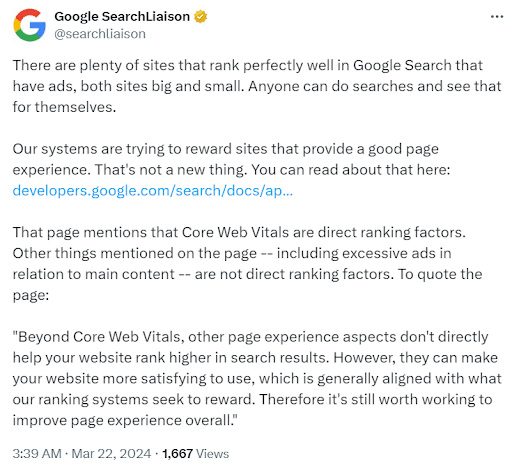
Google Systems Reward Sites with Good Page Experience
9. What Advice Does Google Give to People Who Got Affected by the Helpful Content Update?
Recently on X, Lee Funke pointed out that her website got hit by the recent Helpful Content Update and asked Google’s Search Liaison for some advice.
In response, Danny Sullivan referred her to a recent blog post. Specifically, this part: “Just as we use multiple systems to identify reliable information, we have enhanced our core ranking systems to show more helpful results using a variety of innovative signals and approaches. There's no longer one signal or system used to do this, and we've also added a new FAQ page to help explain this change.”
He went on to say that the recent changes look more closely at pages rather than entire sites.
Sullivan also pointed out that ranking can drop for a variety of reasons, including that Google simply determines that other content is more helpful.
10. What Does Google Really Want You to Show on Your Website?
This past week on X, somebody suggested a novel SEO idea: add a shopping cart to your website.
Another poster replied that she might do the same, because it “shows Google” that her site does more than just affiliate/review content.
Danny Sullivan responded to that as follows: “I wouldn't recommend people start adding carts because it ‘shows Google’ any more than I would recommend anyone do anything they think "shows Google" something.”
He went on to say that you should focus on creating content that’s designed for visitors, not Google.
11. Does Mass Publishing Convince Google That You Have Quality Content?
No.
As you might recall, last week I mentioned that Google will crawl quality content more often.
Some SEOs apparently got it in their heads that if they publish more content, Google will consider it high quality.
Google’s John Mueller addressed that on LinkedIn: “I see some folks try to turn this around, pushing their content to be crawled more frequently, so that Google will think it's good. IT DOES NOT WORK THAT WAY, IT DOES NOT MAKE ANY SENSE. HELLO. Your kids won't start loving kale if you force it down their throats in the same way they stuff ice cream in their faces.”
He went on to say that you should “make truly awesome things.”
12. Is Your Site Affected by This WordPress Plugin Vulnerability?
If you’ve got a WordPress website and the Essential Addons for Elementor plugin, your site could be open to attack.
According to a security bulletin from Wordfence, the plugin includes a store cross-site scripting vulnerability. That means a hacker can upload a malicious script that affects visitors.
Fortunately, the problem is fixed in v5.9.13 of the plugin.
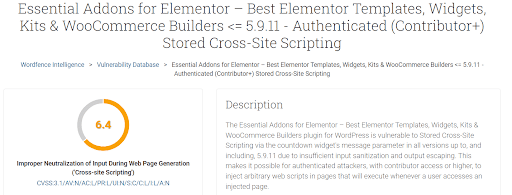
WordPress Vulnerability
13. What’s the Latest Media Type Available in Structured Data?
It’s 3D model markup.
Google just announced the new media type on its Search Central “What’s New” section.
It’s designed for use with ecommerce sites. Some sites display 3D models alongside product descriptions to give shoppers more info about the item offered for sale.
The whole point of the new addition is to make it clear that the 3D model is associated with a specific product.
In the past, 3D models appeared on pages with multiple products. It wasn’t always clear which product related to the model.

3D Model Markup
14. What’s This Week’s TikTok Guide?
Another week, another guide from TikTok.
This time it’s about lead generation. And TikTok released it in partnership with Hubspot.
It’s got tips on:
- Lead gen forms
- Hooks
- Messaging
- Calls to action
The guide also advertises a limited-time discount for Lead Gen Ads. You can get a $1,500 ad credit for a $1,000 investment.

TikTok & HubSpot Lead Generation Playbook
Homework
Take some time away from crying over your broken March Madness bracket to handle these action items:
- If you use 3D models on your ecommerce site, take advantage of that new markup.
- If you’re using the Essential Addons for Elementor plugin, be sure to upgrade to the latest version of the plugin.
- Avoid deleting your old YouTube videos.
- Check out the latest TikTok guide on lead generation.
